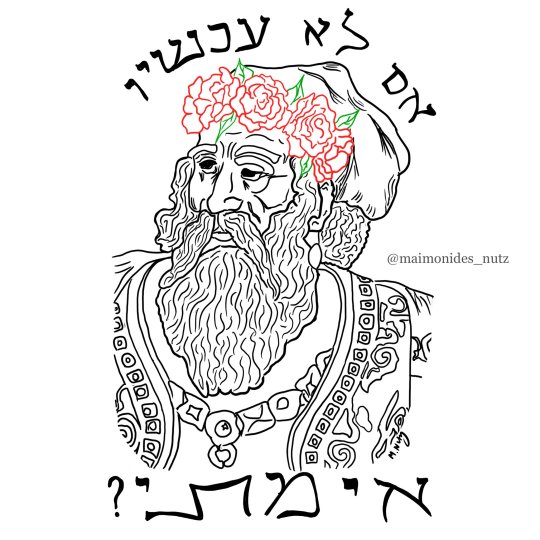#pirkei avot
Explore tagged Tumblr posts
Text
GIFTS FOR THE HOLIDAYS




Do Not Be Daunted - Art Board Print
Do Not Be Daunted - Poster
Do Not Be Daunted - Acrylic Block
Do Not Be Daunted - Art Print
28 notes
·
View notes
Text
One of my life's hard-won lessons is that people basically do what they want to do.
If someone is treating me poorly and they do not respond to my requests to stop or change their behavior, that's not because I didn't ask the right way. It's because this is how they want to act.
So I'm going to skip the political recriminations that the left didn't offer the right messaging or that Dems need to work harder to appeal to [insert demographic here] voters.
The voters had the information they needed and they have made their choice. It is not our job to coax people into caring about others/the planet/their own future. Voters are not cats hiding under the bed. It's insulting to everyone to act like they are.
This is what most of the voters wanted. Accepting that fact means we are in a much better position to do real good where we can instead of continuing to bang our heads against the wall of indifference.
I reject the idea that I have to make caring palatable for people who don't wanna. Letting go of that "obligation" to perfect the message frees my energy for things that will actually move the needle.
Remember the Pirkei Avot: "You are not obligated to complete the work, but neither are you free to desist from it."
#politics#us politics#election 2024#kamala harris#election day stress#democracy#democratic party#letting go#way forward#activism#resistance#pirkei avot#jumblr#tend your own little garden#self care is resistance
22 notes
·
View notes
Text

NEW DESIGN: Continuing the tradition of important rabbis (or figures) in contemporary garb, I present to you: Hillel the Elder in a flower crown! Why did I draw Hillel in a flower crown? Maybe it is because of his known kindness and openness…or maybe it’s just because I was feeling a little silly. Either way, now it’s an image that exists.
The text says “if not now, when?” from his famous teaching in Pirkei Avot: “If I am not for myself, who is for me? But if I am for my own self [only], what am I? And if not now, when?”
For me, it’s a movement. It means grounding, balance, and action. It’s a way to address both the joys and pitfalls that come into your life. It’s a way to expect them and move through them.
It’s more than a saying, it’s a way to live.
Available in many colors and styles! (Scroll down from the image to see all the products in the “similar products” field)
https://maimonides-nutz.creator-spring.com/listing/floral-hillel?
175 notes
·
View notes
Note

That quote, DAMN, thank you for that. It's etched on my heart now.
I recently found out that this is actually a splice of two different quotes. The part from "It is not your responsibility..." to the end is actually in the Talmud, but the first part was written by Rabbi Rami Shapiro in 1995. Still a good quote, I just wanted to make sure I set the record straight.
21 notes
·
View notes
Note
are there any Jews who view Jesus in a positive way (aside from like messianic Jews who, as far I’ve understood, are considered evangelical Christians by all other Jews)
Okay, ah, to answer this question simply: to my knowledge, as far as Jewish communities who (1) self-identify as Jewish, (2) consider themselves practicing Judaism, and (3) deny that Jesus of Nazareth is the Messiah go, none of them have an "official" stance on Jesus. Jesus may be a false Messiah, but this is only a "doctrine" in Judaism the same way that the fact that Vissarion of Siberia is a false Parousia of Jesus is a "doctrine" in Christianity — which is to say, not so much an actually asserted belief, but a natural corollary to more deeply held beliefs.
That being said, individual Jewish people have held a variety of beliefs about Jesus of Nazareth. Some of them are, well, quite negative. For example, one Hasidic story tells of how the Baal Shem Tov saw Jesus and Sabbatai Zvi (both false Messiahs) stuck in the same level of Hell together; the infamous Toledot Yeshu, a parody gospel, certainly does not paint Jesus or His Mother in a particularly good light; Maimonides doesn't even use the usual "may his name be blotted out" as he would when talking about an enemy of Israel, but instead uses "may his bones be ground to dust" after citing Jesus by name.
There are relatively sympathetic views among those whose views are negative too, for the record; for example, there's a story of a Rabbi, Yehoshua ben Prachya, who was said to have been incredibly cruel to a student, and by the time he chose to relent that student had already gone off to form his own idolatrous sect. Struck by the consequences of his harshness, he would go on to emphasize the importance of kindness and giving people the benefit of the doubt. Though the timeline doesn't match up (Yehoshua lived two hundred years before Him), some commentators identified this student as Yeshu the Nazarene.
But, let's actually answer your question. You will find a spectrum of relatively positive views. Bob Dylan technically falls outside the parameters I listed above because he does seem to believe Jesus is the Messiah, but I'll use him as the extreme example, because he continued to be active in his Orthodox Jewish community after his conversion. You also have Leonard Cohen, whose Jewishness was very important to him, who could at least understand the importance of the mystical connection to Jesus that Christians claimed as their own — "the figure of Jesus, nailed to a human predicament, summoning the heart to comprehend its own suffering."
You have some scholars, like Amy-Jill Levine; in the work she did in The Misunderstood Jew, The Historical Jesus in Context, and The Jewish Annotated New Testament, she tries to emphasize the idea that the Person of Jesus is something that can bring Christians and Jews into closer ecumenical dialogue; that if Christians could get more comfortable with the Jewish context of Jesus, and if the Jewish community could see the New Testament as a corpus of texts that isn't non-Jewish, but rather a particular type of first century Jewish, then there could be ground for both groups to better understand each other.
During the early modern period, there were attempts by some Jewish thinkers to reclaim Jesus. Rabbi Jacob Emden argued that Jesus never meant to abolish the Law, and that He has actually "done a double kindness in the world" by increasing veneration of the Torah and bringing light to the Gentiles, if only the Gentiles could learn how to properly interpret their own Scriptures (talk about flipping the script!). Moses Mendelssohn also claimed that Jesus never meant to abrogate the Law, and suggested that Jesus and the early Christian community could be models that modern 19th century Jews living among oppressive Prussian authorities could emulate.
The above paragraph was about Jewish individuals who tried to distance Jesus from traditional Christian understandings of Him. So I'm going to end, I think, with Rabbi Jacob Neusner, who engaged the Gospel on its own terms. In 1993, he published A Rabbi Talks with Jesus. In this book, Rabbi Neusner imagines himself as a first century Jewish man and tries to earnestly listen to and consider the words of Jesus as depicted in the Gospel of Matthew. This work places the words of Jesus in conversation with the Rabbinic tradition, and ultimately ends with Neusner being unconvinced and unable to follow Jesus as His disciple. Pope Benedict lauded this work as an authentic exercise in interreligious dialogue, and cites it frequently in his own Jesus of Nazareth.
#asks#Jesus Christ#Christianity#Judaism#Moses Mendelssohn#Jacob Neusner#Amy-Jill Levine#Toledot Yeshua#Talmud#Baal Shem Tov#Maimonides#Leonard Cohen#Bob Dylan#Yehoshua ben Prachya#Pirkei Avot#Jacob Emden#Sabbatai Zvi#Messiah#religious pluralism
24 notes
·
View notes
Text
You are not obligated to complete the work, but neither are you free to abandon it.
Pirkei Avot
17 notes
·
View notes
Text
“You are not obligated to complete the work, but neither are you at liberty to abandon it”
(quoting Mishnah as a means of encouraging myself to wade back into trying to write my WIPs)
27 notes
·
View notes
Text

My Judaism is Anti-Zionist
#free gaza#free palestine#jewish voice for peace#jewsforpalestine#anti zionisim#jewish antizionism#pirkei avot#jewish tradition
6 notes
·
View notes
Text
Israel has always asserted its right to live. At the fringes of history, often the object of events, Israel has always seen itself at the center of history and the cause and subject of what happens. To be a Jew, to be Israel, always has demanded conviction despite, not on account of, the condition of the world - and of Israel itself. So it was then, and so it is today. To be a Jew is an act of affirmation, an act of faith, an act of hope. It is not a ratification of how things really are. To know what to answer the unbeliever is to know how to live in the world as it is. To maintain the faith of Israel is to know how to live in the world as it should be; and, we believe, as in God's own time, it will be
-Torah from our Sages: Pirkei Avot, Jacob Neusner (1984)
2 notes
·
View notes
Text
i'm studying pirkei avos and in chapter 2 when we get to yochanan's pupils and it says they all said three things and then they give their sayings i can't help but imagine it's like senior quotes or passing around a card to sign at the office or something. like somebody knocks on their door and goes like "hey elazar they're compiling the mishna you wanna put anything in here?"
7 notes
·
View notes
Photo
לא עליך המלאכה לגמור ולא אתה בן חורין להבטל ממנה

287K notes
·
View notes
Text




48 notes
·
View notes
Text

“You are not obligated to finish the work, nor are you free to abandon it” (Pirkei Avot 2:16)
Happy Earth Day!
360 notes
·
View notes
Text
What happens when an angel and a demon sit down to study Pirkei Avot (Ethics of Our Fathers)?
...Presenting the first in what will hopefully become a series of works about Little Ash and Uriel learning together! This story is set at the very beginning of their partnership, shortly after the events in Rabbi Yisroel's Demon.
Acquire for Thyself a Friend
(Rated G, about 1200 words.)
Excerpt:
“Nittai the Arbeli says,” Little Ash read out loud, “keep a distance from an evil neighbor, and do not become attached to the wicked—” He broke off. “Did you hear that? ‘Evil neighbor’ — that’s talking about me, obviously. I’m a neighbor and I’m wicked. And see, Nittai here says you should stay away from me.” The angel, sitting with its tallis-wrapped shoulder pressed close against Little Ash’s, was evidently doing a very poor job indeed of maintaining distance. It looked thoughtfully at the text, then back to Little Ash. “I don’t think so,” the angel currently named Debate said, in the polite way that Little Ash had already learned was a sign that a complete and utter refutation was imminent.
#when the angels left the old country#fanfiction#dandelion fics#wtaltoc fanfic#uriel federman#little ash#jumblr#pirkei avot#shtetler angels
14 notes
·
View notes
Text
The survivors then have to say this to the survivors now: for a Jew, it is a sin to despair
-Torah from our Sages: Pirkei Avot, Jacob Neusner (1984)
2 notes
·
View notes
Text
Shavuot - Judgment Day for Torah Study
I know what you are thinking right now. We aren’t near Rosh Hashanah; Isn’t the upcoming holiday Shavuot, the holiday celebrating the giving of the Torah. Why are you posting an image of judgment scales, which would be more appropriate to share in a few months for Rosh Hashanah? Wouldn’t this be a better picture to depict Shavuot? Yet, if we examine a recently I came across fromom the Shlah…

View On WordPress
#effort#growth#Jewish holidays#judgment day#new beginnings#new beginnings spiritual coaching and consulting llc#Pirkei Avot#shavuot#spiritual growth#Spirituality#Torah#torah study
1 note
·
View note